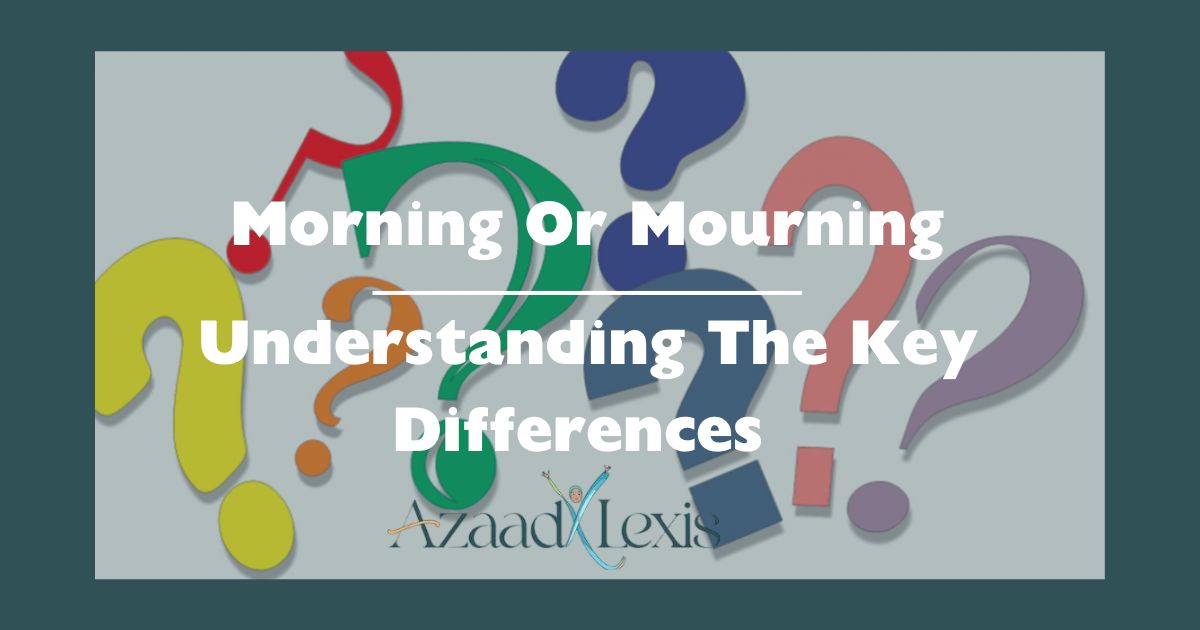The English language is full of fascinating twists and turns, with words that sound alike but mean entirely different things. Homophones, like “morning” and “mourning,” often confuse even the most proficient speakers.
These two words may sound identical, but their meanings and contexts are worlds apart. In this article, we’ll break down the differences and provide practical tips to ensure you never mix them up again.
What Is Morning?
Morning is the early part of the day, typically from sunrise until noon. It symbolizes new beginnings and is often associated with starting daily routines or activities. The word comes from the Old English “morgen” and is widely used in greetings like “Good morning!”
Definition and Usage
Morning refers to the early part of the day, typically the time between sunrise and noon. It signifies a fresh start, a new beginning, and is associated with daily routines and greetings. Whether you’re sipping coffee at dawn or heading to work, the term “morning” plays a significant role in describing this part of the day.
Morning Meaning and Pronunciation
The word “morning” is pronounced as /ˈmɔːrnɪŋ/ and functions as a noun. It can also describe the early stages of events or developments, such as “the morning of her career.”
Examples of Morning in Sentences
- The morning sun streamed through the windows, waking her gently.
- We’ll have our team meeting first thing in the morning.
- After a refreshing run, she felt energized to tackle her morning routine.
Scenario Example
Imagine you’re on vacation and wake up early to watch the morning sunrise by the beach. The calm waves, coupled with the golden hues of dawn, create the perfect start to your day. Here, “morning” captures the serene beginning of your experience.
Definition and Usage
Mourning refers to the act of expressing grief or sorrow, usually in response to the death of someone. It encompasses cultural practices, emotions, and rituals associated with loss. Mourning can be deeply personal or shared communally, depending on the context.
Mourning Meaning and Pronunciation
The word “mourning” is pronounced as /ˈmɔːrnɪŋ/, identical to “morning.” It functions as both a noun and the present participle of the verb “to mourn.”
Examples of Mourning in Sentences
- She wore a black dress as a symbol of mourning for her late grandmother.
- The country observed a period of mourning after the tragic event.
- His poetry beautifully captured the emotions of mourning and loss.
Scenario Example
Picture a family gathered to remember a loved one who has passed away. They share memories, tears, and words of comfort. The solemn atmosphere reflects their mourning, a heartfelt expression of sorrow and remembrance.
Key Differences Between Morning and Mourning
While “morning” and “mourning” sound the same, their meanings and applications are entirely distinct.
Side-by-Side Comparison
| Aspect | Morning | Mourning |
| Definition | The early part of the day | The act of grieving or sorrow |
| Part of Speech | Noun | Noun, Present Participle |
| Associated With | Daily routines, new beginnings | Grief, loss, cultural rituals |
| Examples | “Good morning!” | “She is in mourning.” |
Read this Blog: Libel Or Liable: Understanding The Difference
Grief vs. Mourning: Is There a Difference?
Yes, there is! While grief refers to the internal feelings of sadness and loss, mourning is the outward expression of those emotions. For instance, wearing black clothing or attending a memorial service are acts of mourning, whereas the pain felt inside is grief.
Common Confusions: Morning vs. Mourning
It’s easy to mix these words up because they are homophones – words that sound the same but have different meanings and spellings. People often confuse them when writing, especially in casual settings.
Tips for Choosing the Right Word
- If it’s about time, like sunrise or daily routines, choose morning.
- If it’s about grief or sorrow, use mourning.
- Remember: “Mourning has a “u,” like “you” in sorrow.”
Everyday Usage Examples
- Morning: “I woke up early this morning to catch the train.”
- Mourning: “He is still mourning the loss of his childhood friend.”
- Morning and Mourning Together: “The world was in mourning the morning after the tragic news broke.”
How to Use Morning and Mourning Correctly
Using these words correctly comes down to understanding their contexts. Morning is about beginnings and time, while mourning is about sorrow and loss. When in doubt, think about the scenario you’re describing.
Quiz: Test Your Understanding
Choose the correct word to complete each sentence:
- I love jogging in the fresh ______ air.
- The family was in ______ after the unexpected tragedy.
- ______ routines often include a warm cup of tea and meditation.
- She is ______ the loss of her beloved pet.
- Flags were flown at half-mast during the period of national ______.
Answers at the end of this article.
Morning and Mourning in a Nutshell
- Morning is a time of day, associated with freshness, routines, and beginnings.
- Mourning is an expression of sorrow, linked to grief and loss.
Final Words
Understanding the differences between “morning” and “mourning” is a small but meaningful step toward mastering the English language. By associating these words with their respective contexts and practicing their usage, you’ll confidently differentiate them in no time.
Keep practicing, and remember: each morning brings new opportunities, even as we honor the moments of mourning in our lives.

